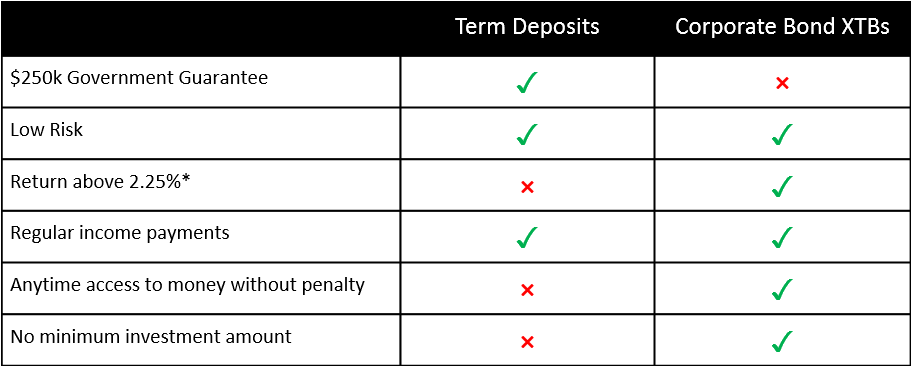Canstar Term Deposits
What is a term deposit and how does it work?
A term deposit is a deposit held at a financial institution, bank, building society or credit union for a fixed amount of time, known as a term. When the money is deposited, the customer understands that the money is there for the pre-determined period which usually ranges from 1 month to 5 years. Typically, the money can only be withdrawn at the end of the period, however it can be accessed earlier but penalties apply. This is usually partial or full forfeiture of the interest rate the term deposit would have earned.
- Canstar’s 2019 Term Deposit Award reveals some of the most impressive term deposit providers available on the market today. Finance News - June 14th Term Deposit Rates Slide Further But Can Savers Still Find Value?
- Canstar's analysis showed 17 institutions made 110 cuts to term deposit rates since the start of January, compared with 47 rate increases. The typical returns from term deposits are well below the.
CANSTAR reveals where you should park your savings. Term Deposits - May 17th The Time To Invest Is Now! The Reserve Bank′s moves in February and May of this year to reduce the official cash rate to an historic low of 2.25% and then 2.00%. With term deposits, you invest funds for a nominated period at a guaranteed rate of return. The term could be from 90 days to five years, and the interest can be paid at varying points. Whether you’re saving for a holiday, house or rainy day, our comparison tables can help you find the right term deposit for your needs. John has $100,000 to invest and decides to take a 3-year term deposit, offering a rate of 3.70% per annum as this is better than the 3.40% on offer for a 12 month term deposit. The approximate income over the first 12 months would be as follows.
Term deposits are popular with investors who prefer the safety of this type of ‘money minder’, as opposed to the fluctuations of, say, the share market. Many investors also use term deposits as a part of their investment mix.
How do I apply for a term deposit?
To apply for a term deposit you follow much the same process as you would when you apply for a normal bank account. It’s even easier if you apply for a New Zealand term deposit at the same institution you already bank with. Once you have earmarked the amount of money you want to invest and the interest rate you are locking in, it is simply a matter of filling out a form.
What if I want to break my term deposit?
If you want to break your term deposit, you need to first understand you could be heading for an uphill battle with your bank. The Banking Ombudsman of New Zealand points out that financial service providers are not legally required to allow customers to access their funds before the fixed term. Some providers offer a “cooling off” period, when you first open a term deposit account – a period of time where you can cancel your tern deposit and have your principal repaid – but without interest. If you can demonstrate you are in hardship, you might be able to withdraw your funds without giving notice.
Pros and cons of term deposits include:
| PROS | CONS |
|---|---|
| You receive a specified interest rate at the end of the term, regardless of whether rates drop in the meantime | Online savings accounts sometimes offer higher interest rates. |
| Savings are locked away, preventing the temptation to spend it all. | Your money is not available for use at any time. You pay a penalty if you need to withdraw your money early. |
| Low-risk investment – less volatility in the term deposit market. | The real rate of return is not as good as it seems. To calculate your actual profit from a term deposit, subtract the current inflation rate from the interest rate paid. For example, if inflation was running at 1% and your term deposit was paying 3%; your “real” rate of return is 2% |
New Zealand term deposits – learn the market rates
Before you agree to open up a term deposit account, it pays to know the rates financial providers are offering, so you can see where your money will have the best chance at growing.
Read the Investment Statement

As with all financial products, it’s imperative you read the Investment Statement so you know exactly where you stand on a number of issues. For example, it’s important to find out whether the provider offers a cooling off period. Even if you have previously taken out a term deposit with the same bank, make sure you still read the document, as conditions can change and you don’t want to be caught out.
Pay particular attention to Maturity conditions, Prepayment penalties and, of course, any fees. Note that the overall return on investment will be affected by any fees you pay, whether at setup or at maturity.
If you think there is a chance you might need to break your term deposit early, then you might want to choose a shorter term, or to explore other options, such as a savings account.
Enjoy reading this article?
Sign up to receive more news like this straight to your inbox.
By subscribing you agree to the Canstar Privacy Policy
Six months or two years? One year or five years? Choosing the correct tenure to get your best term deposit rates in New Zealand can be quite the minefield.
The choice of tenure of your term deposit can make a huge impact on whether you are really getting a high interest term deposit. While it can be tempting to simply look for the best term deposit rates on offer, this is not the only factor.
Aside from looking for a high interest term deposit, also consider:
When do you need the money?
Once you invest in a term deposit, the money is there for the entire length of time selected. It might be easy to overlook this if you see dollar signs with a high interest term deposit, but you could get caught out if you need the money before the term is up. It’s important to be realistic about how long you can practically lock your money away.
What are the withdrawal penalties?
If you do need to access your money early, be aware that early withdrawal penalties apply on term deposits – and they can be steep! According to the Banking Ombudsman Scheme, if providers agree to break the term deposit, it will most likely reduce the rate of that high interest term deposit that you gleefully signed up to. The provider might also seek to recover interest that was paid at the higher rate during the term of the deposit. The reduction in interest may depend on the amount you put into the account, the current interest rates, and the length of the term.

Is the security of the institution acceptable?
Investors should make themselves familiar with the credit rating of their selected institution and ensure that they are comfortable with that rating.
The hunt for the best term deposit rates in New Zealand
While we can’t provide you with a magic formula for finding the best term deposit rate in the country at any given time, we can certainly make the process easier by giving you a good range of providers’ rates to compare. It’s also important to keep in mind how changes to the Official Cash Rate can impact on term deposit interest rates.
Banks set their term deposit rates around what they expect to happen in the wider economy and may sometimes pay a small premium for longer-termed deposits. While none of us have a crystal ball, it’s important to be aware that interest rate movements during the term of your investment will affect your return either for better or worse.
At the time of writing, the Reserve Bank of Australia had just ruled to lower the OCR to a record low 1.5%. In an interesting move from Australian banks, the larger banks swiftly moved to pass on some of that rate cut to borrowers, while increasing term deposit rates.
The Reserve Bank of New Zealand is due to review its cash rate on 10 August and economists are predicting it will reduce the rate from its current 2.25%. Should this happen, it will be interesting to see whether New Zealand follows in Australia’s footsteps and passes on some of this rate to savers using term deposits. This move could give New Zealanders a greater chance of finding a high interest term deposit.
Fixed Term Deposits
It should be noted, though, that when interest rates are low, the effect of a rate change will not be overly significant unless you are investing a substantial amount of money.
Term Deposit Example
John has $100,000 to invest and decides to take a 3-year term deposit, offering a rate of 3.70% per annum as this is better than the 3.40% on offer for a 12 month term deposit. The approximate income over the first 12 months would be as follows:
| Interest Rate | Income Earned | |
|---|---|---|
| 12 month term deposit | 3.40% | $3,400 |
| 3 year term deposit | 3.70% | $3,700 |
| Difference | $300 in favour of 3 year TD |
After one year, John has earned an additional $300 on his funds by choosing the higher interest rate of the three year term deposit.
But what if rates increase?
Let’s assume that at the end of the first year, the official cash rate is on the rise and the 12 month term deposit rates on offer have increased from 3.40% to 4%. John’s income in year two would look as follows:

| Interest Rate | Income Earned | |
|---|---|---|
| 12 month term deposit | 4.00% | $4,000 |
| 3 year term deposit | 3.70% | $3,700 |
| Difference | $300 in favour of 12 month TD |

At the end of the second year, John would have earned the same amount on his funds whether he chose a 3 year fixed rate or two 12 month fixed rates, as the higher income earned on the 3 year term deposit in year one was cancelled out by the higher interest earned on the 12 month term deposit in year two.
Best Term Deposits
Whether John would earn more from fixing for three years or more for fixing for 12 months would therefore come down to the interest rates on offer at the two year mark.
The bottom line with choosing a term deposit length:
It’s impossible to get the tenure right every time and even the best economists can’t predict the future. Being realistic, though, about your need to access the money in the future and the likely economic trends will help you balance getting a high interest term deposit, with your other needs – such as access to your funds.